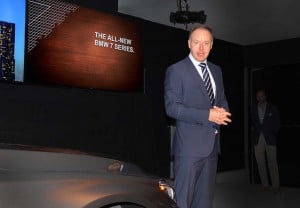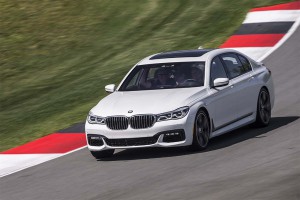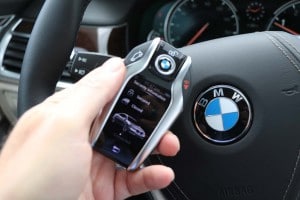
Can you lay claim to building “the ultimate driving machine” if your fleet is filled with autonomous vehicles powered by plug-in hybrid and pure battery-electric drivetrains? That’s the very real question facing BMW.
The Bavarian maker’s sixth-generation 7-Series sedan comes as close to hands-free driving as anything on the road, and company officials promise they’re ready to push things further if regulators give them the go. The 2016 7-Series, meanwhile, will add a new plug-in model next year, with the technology set to roll out on a variety of other models over the next several years.

“This is the flagship,” said Ian Robertson, the BMW board member in charge of global marketing, during a New York media drive of the new 750i sedan. “This is the vehicle that brings the latest innovations that will be spread through the rest of our line-up in the coming years.”
(Click Here for a review of the new 2016 BMW 750i.)
Some of those technologies might seem hard to reconcile with the image of BMW, the maker of some of the world’s sportiest automobiles, Robertson acknowledged during a subsequent interview with TheDetroitBureau.com. But BMW can’t operate in a vacuum, he added, and most adapt and adopt to meet both consumer trends and tightening government mandates.

Those include not only tough new fuel economy and emissions rules but the likelihood that many of the world’s mega-cities will soon move to ban all but zero-emissions vehicles, said the British-born executive. That would include pure battery-electric vehicles, plug-in hybrids and, perhaps someday, even hydrogen fuel-cell vehicles.
The good news, said Robertson, is that “We believe hybrid technology is now advanced enough to be an attractive proposition.”
Plug-in technology has evolved rapidly since General Motors put the first mainstream model, the Chevrolet Volt, into production six years ago. Sibling brand Cadillac, for example, will launch a PHEV version of its new CT6 flagship next year and Caddy officials promise it will match the performance of that brand’s new flagship, the CT6.
BMW will take things a big step further – and faster – several company sources told TheDetroitBureau.com earlier this month. The next generation of the BMW M3, the spiritual center of the brand’s performance line, will go plug-in. While Robertson declined to either confirm or – deny — that report, he did say that BMW will soon have plug-in versions of both the big X5 utility vehicle, the new 7-Series, and then the mainstream version of the 3- and 5-Series models.
(Next BMW M3 to get plug-in hybrid drive. Click Here for this exclusive report.)
For more than a century, said Robertson, “the definition of performance was how big an engine and how many cylinders your car had.” No longer. BMW has already begun migrating to smaller, high-tech engines, such as the 4.4-liter turbo V-8 in the 750i. And with “the next generation, with hybrid technology, the power-to-engine-size formula will not be relevant anymore.”

How much further might BMW – and its competitors – go? Asked if there could come a time when all of the maker’s products use some form of battery assist or a complete battery drive system, Robertson suggested, “We’re increasingly on that road.”
The push into battery power leans heavily on what BMW has been learning from its second sub-brand, the battery-based BMW i. That includes not only the advantages of electrification, but also the use of carbon fiber. The new 7-Series, for example, sheds about 200 pounds, in part through the use of that super-light, ultra-strong material.
It’s not the first time BMW has pushed technological boundaries – or raised questions about its strategy. The maker launched the new millennium with the debut of its once-radical iDrive system. The new 7-Series will introduce the fifth-generation version of that infotainment system controller. The big luxury sedan also will add a new tablet controller for back seat occupants will those up front will be able to do things like answer or reject phone calls, and change volume, simply by using gestures.
“We will definitely seed a lot more technology (from the 7-Series) into the mainstream of our cars,” promised Robertson. That will include some of the more advanced safety technologies, such as a forward collision avoidance system that not only can apply the brakes automatically but even steer out of the way to avoid a crash.
Like so many of its competitors, BMW is adding a variety of semi-autonomous features to the new 7-Series. The 2016 model will be capable of driving hands-free on the highway, though the maker will limit that to a maximum 15 seconds before requiring a driver puts hands back on the steering wheel.
The system actually is capable of operating hands-free far longer, but BMW officials say they are currently limited by regulatory guidelines. They would revise that if the rules change.
Current safety regulations, in fact, will bar a number of features offered on the European version of the 7-Series from coming to the U.S. That includes laser lights that can reach nearly half a mile and move to illuminate a curving road. American buyers won’t be able to get the new auto-park feature. Going beyond the current technology that can pull a car, hands-free, into a parking spot, the new system allows a driver to exit the vehicle, press a button on the new “smart” keyfob, and have the 7-Series automatically pull into an owner’s garage.
But such features again raise the question of whether they fit BMW’s vaunted image as the performance benchmark of the luxury car market.
“Luxury has many dimensions to it,” Robertson insisted, adding that the availability of all that new technology doesn’t mean BMW will move away from the core of what it has long stood for. All those features can’t change the company’s focus on driving performance and dynamics.
“We have to maintain that DNA with no deviation,” he said.
The launch of the new BMW 7-Series will provide a critical test of whether buyers think the company has retained that focus.
(BMW one of 10 carmakers sued over “deadly” keyless ignition systems. Click Here for the full story.)








A lot of BMW sales are for status so those consumers are not the folks buying the cars for the ultimate driving experience. Those who do buy BMWs for serious performance driving may not embrace hybrids as much as BMW hopes for.
Instead of thinking in the past, which is what other car companies do. In the past BMW made cars that offered value with the public after WWII with three wheelers because of conditions its customers energy costs. Moving to hybrids and battery powered cars is the next logical step with increased costs of operation and variety of conditions its vehicles operate in different countries around the world. Not locked into one view of the future.
Don’t count on any serious EV sales any time soon. EV’s are not cost effective at all even with undeserved subsidies. The major car makers are offering hybrids, EVs and bicycles because they need all the help they can get to reduce the fines they will be charged for all of their fleet when they are unable to make the 54.5 mpg CAFE requirement. Few people have any interest in EVs except tree huggers and those looking to impress the neighbors. That is why sales suck and demand has dropped now that the tree huggers have all bought their new EV toys.
The lack of impracticality has also become apparent to many who didn’t bother to consider that they’d need a real car for any reasonable length travel over a couple hundred miles unless they travel out of their way to wherever they can find a quick charge station or spend hours at a truck stop recharging.
There are far more reasons to not buy an EV than to buy one. That hasn’t stopped a few gullible people however. Much like gasohol the unscrupulous politicians in DC continue to dupe the naïve. Those with a clue have simply said: “NO” to EVs.
From the Tesla owner’s forums regarding battery cost:
“Tesla has said that the replacement cost is about $30,000. That being said, you can buy the pre-paid replacement option for $12,000. The reason for the discrepancy is due to the fact that the expected life of the battery is about 10 years at which the future value of the $12,000 upfront is closer to $15,000”.
When better EVs are made they will all use hydrogen fuel cells which eliminate a lot of the issues with battery powered EVs. Battery power has never made any engineering since and it’s not any more logical today than are electric batteries for home power back up. Wait until Musk closes up the Mega Farce Factory and see what nonsense he spins over that tax payer waste of money.
“do hybrids, battery-cars and autonomous vehicles fit the brand?”
No, not yet. The perception of driving pleasure will likely change, however. The brand will change with it. BMW has made some terrific cars in the past. I’ve owned – and own – a few. None of the current lineup enthuse me. My perception of driving pleasure has yet to change.
Jorge how is the oil companies paying you?